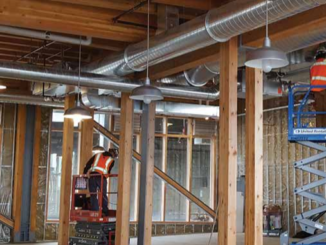
Prompt payment legislation is provincial legislation that assists and ensures participants in the construction chain receive payment for goods delivered and services rendered. It means no individual or group of service providers carry an unfair burden of the construction risk and costs, and it removes unnecessary impediments to delayed payment.
Construction is a high-risk business conducted through a hierarchy of supervision and pay-masters.
Owners and developers are at the top and usually contract with a prime or general contractor, who in turn sub-contracts with a series of specialist trade contractors. These companies or individuals may also sub-sub-contract with even more specialized trades, all working in concert to deliver a built structure.
As work to complete a structure progresses, the intention is that payment for the work will progress in tandem. According to a presentation by Prompt Payment BC, many standard form contract agreements indicate payment terms within 30 days of billing, meaning “30 days after work of the previous 30 days has been completed and for which payments have been made by trade contractors for wages and materials for the work completed.”
Trends in industry over the past two decades have seen many changes to standard payment terms, the most onerous of which has been the introduction and use of “pay when paid” clauses, which mean payment may be arbitrarily delayed by each party in the hierarchy withholding payment to sub-trades until that party actually receives payment from the party above.
Trade contractors inherit such terms from the ‘head contract’ but remain obliged to pay employees and suppliers regularly on time. The trade contractor is effectively financing the construction project.
What does delayed payment look like?
A survey conducted in 2014 among Alberta trade contractors showed 86 per cent of companies surveyed said late payments were a “moderate or serious” problem. For 2014, the average number of days in accounts receivable was 78.60 days, the average amount of bad debt reported was $17,018.55, and the average amount outstanding for accounts 60 days or more overdue was $223,819.92—predominantly from private accounts.
Who is affected?
Predominantly, small businesses bear the brunt of delayed payment. BC’s stats report a current construction workforce of 226,000 or in excess of 9% of labour force. WorksafeBC identifies some 15, 250 firms in the BC industrial-commercial- institutional marketplace, and 11,250 Worksafe-registered employers report payrolls between $100,000 and $500,000— meaning companies with 1 to 7 employees. A further 4,000 companies have payrolls of $500,000 or more annually.
What are the effects overall?
Employment is lower because the amount of operating expenses that a trade contractor can support has been reduced by the increased in payment risk. Some trade contractors have resorted to off-loading payroll risk by increasing the number of self-employed, independent operators in their workforce.
Fewer apprenticeships are created because of lacking willingness to make long-term employment commitments that are required to recoup the investment in training.
Increased payment risk leads trade contractors to make fewer investments in new machinery and equipment, reducing the long-term productivity in construction and raising costs overall.
All construction costs, both government and private, are higher because trade contractors have incorporated the risk of late payment by general contractors into their bids, driving prices higher.
All government costs – provincial, school board, and municipal – are also higher because increased risk reduces the amount of work trade contractors can afford to take on, thus reducing the bidding pool for projects.
Where is prompt payment?
Until very recently, Canada was the only Western country that had not adopted some form of prompt payment legislation. Laws that ensure subcontractors get paid on time are in already place in Australia, Ireland, New Zealand, the United Kingdom, and the United States. Meanwhile, the European Union has adopted a motion to require all EU members to enact prompt payment legislation.
S-224 passed the Senate in May and is before parliament, with the Liberal government now agreed to initiate a broad-based consultation process with a view to legislation soon. Bill 142 has passed its third reading in Ontario unanimously with all party support and is currently awaiting Royal Assent.
The Province of Saskatchewan has communicated to industry that it is prepared to introduce an Ontario modelled bill in the spring of 2018, as has the government of New Brunswick. Alberta has revised government procurement payment rules to remove delays, and is reviewing legislation options, while Quebec’s Charbonneau Commission identified delayed payment as a contributor to corruption in the construction industry, prompting the government to regulatory and legislative change.
Who supports prompt payment legislation?
This article is sponsored by COCTA – the BC Council of Construction Trades Association, but others are adding their support. COCTA is modelling its strategy in favour of prompt payment legislation after Ontario’s, where all of industry is on board. Labour also supports legislation that ensures workers get paid.
Moving forward
Prompt payment is the best alue for tax payers dollars, since governments are currently paying more for infrastructure because specialty trades are building in the costs of slow payment. Trade contractors are shouldering the risk, and with no access to the prime contractor, this puts contractors at risk. In addition, slow payment creates an external cost to labour and labour relations in trying to recover wages and benefits.
Every other western jurisdiction has reached the same conclusion—payment problems cannot be corrected through contract language. Prompt payment legislation is a win for small businesses and for government.



